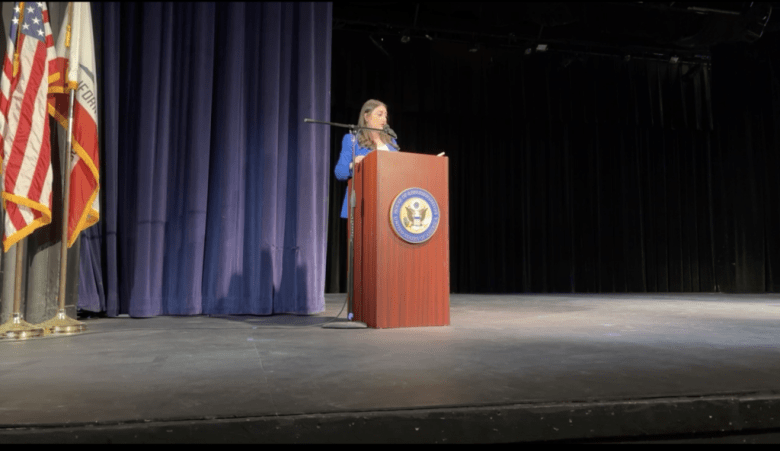Congresswoman Sara Jacobs recently convened a highly anticipated in-person town hall meeting at Madison High School in Clairemont, providing a crucial forum for constituents to engage directly with their representative on a range of pressing national and international issues. The gathering saw Rep. Jacobs fielding pointed questions that spanned from the tactical resistance against the Trump administration to the deeply sensitive and often contentious Israel-Palestine conflict, alongside a variety of pertinent local San Diego concerns.
Following a concise set of opening remarks, Rep. Jacobs immediately shifted to addressing the public’s inquiries, with the initial line of questioning focusing on the concrete steps and strategies being employed by Democrats to counter the policies and influence of the Trump administration. This topic resonated strongly with many attendees eager to understand the legislative and political landscape.
Jacobs articulated a multifaceted, four-part strategic framework designed to push back effectively against the Trump administration’s agenda. She prefaced her explanation by drawing a compelling analogy, clarifying that Democrats are currently playing a “zone defense” rather than a “man-to-man” strategy, indicating a broader, more systemic approach rather than direct, one-on-one confrontations.
The first component of her strategy involved the proactive introduction of legislation, even in instances where its passage might appear unlikely, underscoring the importance of establishing a legislative record and proposing alternative pathways. Litigation formed the second critical aspect of her plan, highlighting the role of legal challenges in constraining executive overreach. Oversight, the third pillar, emphasized congressional accountability and scrutiny.
The fourth and final part of her strategy underscored the vital role of public pressure and direct civic engagement. Jacobs stressed that showing up, asking critical questions, and collectively voicing frustrations are paramount, asserting that such consistent public involvement can indeed catalyze significant behavioral changes within the political sphere and among elected officials.
The town hall then pivoted to international policy, with a significant portion of the discussion dedicated to the ongoing and deeply complex conflict between Israel and Palestine. Rep. Jacobs’ response to inquiries on this issue elicited a notably diverse and impassioned range of reactions from the attending constituents, reflecting the profound divisions and strong opinions surrounding the subject.
The auditory landscape of the hall during this segment was a vivid tapestry of contrasting sentiments; applause, audible jeers, and even chants periodically punctuated Rep. Jacobs’ attempts to articulate her position. A significant portion of the audience expressed approval for her stance against providing offensive weapons to the Israeli government, viewing it as a move toward de-escalation. Conversely, a vocal contingent expressed profound disappointment and upset that she refrained from formally categorizing the dire humanitarian crisis in Gaza as a genocide, highlighting the intense emotional and moral stakes involved.
Shifting closer to home, Rep. Jacobs also brought the discussion back to the localized impact of national policies, emphasizing San Diego’s unique position as a border community. She articulated a strong conviction that “all of us here in San Diego have a responsibility to talk about the role the border and immigration play in our lives,” highlighting the region’s intimate connection to these critical issues.
She candidly characterized the Trump administration’s past immigration enforcement policies as “horrific” while acknowledging the current legislative hurdles. Despite her personal desires to implement substantial legislative fixes, Jacobs conceded that, given the Democratic minority status in Congress, many desired changes are not presently feasible. She powerfully concluded by reiterating San Diegans’ crucial role: “I think we have a really important role here as San Diegans, because we are a border community, right? Like we know better than most how important our immigrant community is to our economy and the fabric of our society.”






Leave a Reply